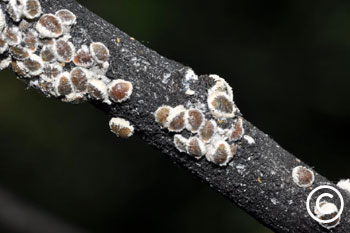Tree Scales Treatment
Tree Scales are a sinister pest affecting many plants in Colorado landscapes; from trees to shrubs and perennials they are common in urban areas. Scales are an insect closely related to the aphid. At first glance, many would not recognize them as an insect. There are numerous species and types of tree scales. In general, scales have a round or oval body type which is flattened and slightly humped in appearance. How scales will affect your trees and what type of tree scales treatment you will require greatly depends on the type of scale species, along with several other environmental factors. Most plants are not harmed by the presence of a few scales, but populations can easily increase dramatically.
A few species excrete a sweet, sticky liquid called “honeydew.” This is produced when the insects consume large amounts of plant sap and is sometimes observed on your car after parking it beneath an infected tree. Even if the species of scale is not harmful for the plant, a black mold can grow on the honeydew and cause problems for people exposed to it.
Identifying tree scale disease can be difficult and is best done with the assistance of a SprayTech expert. Scales can be located almost anywhere on a plant. There are two common groups; armored scales and soft scales. In order to properly utilize tree spraying for tree scales treatment, it is important to identify which family your scale species belongs to. Most insecticides work on certain types of scales and not others. There are also several species of insects that can look like scale.
Signs of Tree Scales Attack

A colony of European elm scales infest an elm branch
Illustrations (Photos by author, Bill Ciesla – from the Colorado State Extension website)
Aside from noting the scales themselves, there are several signs that your plants have become infested with scale:
- Wilting/Yellowing: Scale can sometimes curled leaves and cause blemishes. Yellowing can occur in fruit, leaves and twigs.
- Premature leaf drop: Leaves with heavy scale populations can cause leaves to die off and drop.
- Honeydew: soft scales excrete honeydew which can cause fruit contamination, and cover leaves and anything below the tree. It also encourages mold growth and attracts ants.
- Slow growing plants: Some species of scale can deteriorate the plant, resulting in less than optimal growth.
- Plant die off: Young plants can be completely killed off by scale infestations lasting several years. Most mature plants will survive but they can lose branches and young shoots.
Tree Scales Treatment & Prevention
There are several methods of tree scale treatment available. You can manually remove some species of scale by scraping them of the trunks and branches of your trees. This can be time consuming, but effective for ostershell scale on small trees. Tree spraying for tree scale disease is useful for controlling many tree scale species. Some horticultural oils can be applied to smother the insects. These oils are used during the dormant season because they can damage new leaf growth.
SprayTech can employ the most effective way to control scales, an insecticide sprayed at the correct time can treat scale when they are most susceptible. The most important factor determining effectiveness of spray as a tree scale treatment is properly timing application during scale “crawler” period. In the Denver, Castle Rock and Larkspur area, crawlers generally emerge between April and June depending on the species and season.
If you think you have a scale infestation, first contact a technician at SprayTech to determine which species of scale you have on your property and help you develop a tree scales treatment plan.

